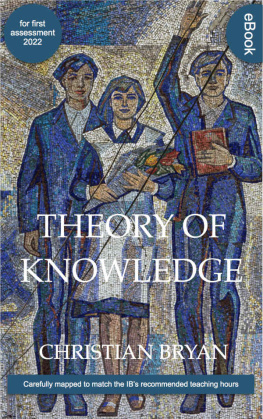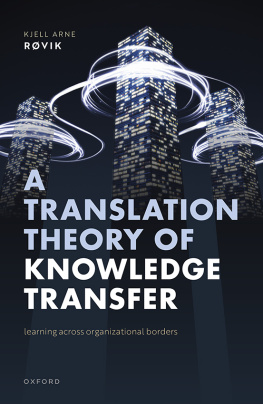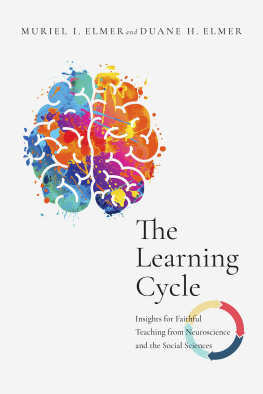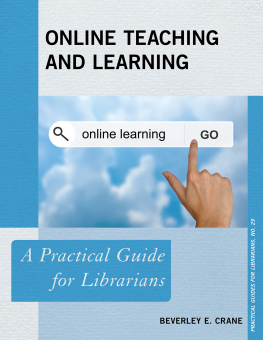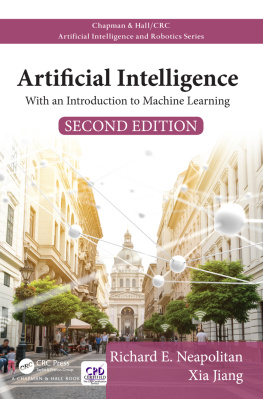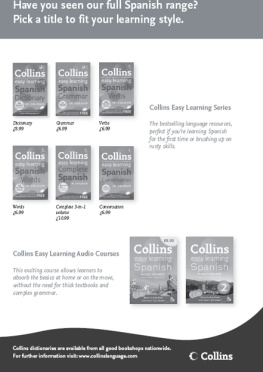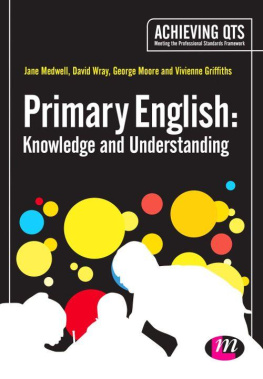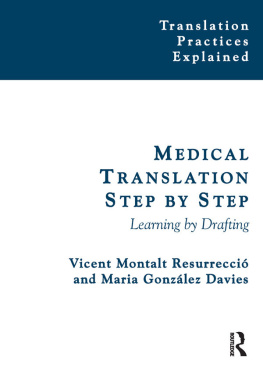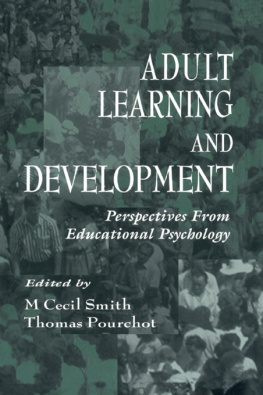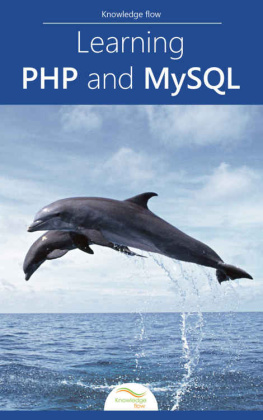Theory of knowledge
for the IB Diploma
Christian Bryan
Copyright 2020 Dr Christian Bryan
All rights reserved
The characters and events portrayed in this book are fictitious. Any similarity to real persons, living or dead, is coincidental and not intended by the author.
No part of this book may be reproduced, or stored in a retrieval system, or transmitted in any form or by any means, electronic, mechanical, photocopying, recording, or otherwise, without express written permission of the publisher.
ISBN-13: 9781234567890
ISBN-10: 1477123456
Cover design by: Art Painter
Library of Congress Control Number: 2018675309
Printed in the United States of America
Contents
Chapter 1: The Theory of Knowledge
The nature of the subject
The Theory of Knowledge course provides you with an opportunity to reflect on the nature, scope and limitations of knowledge as well as the process of knowing. In this way, the main focus of TOK is not on acquiring new knowledge but on helping you to reflect on, and put into perspective, what you already know and are beginning to learn in your IB Diploma subjects. You are expected to use your learning and knowledge from the other subjects to inform and build your knowledge within TOK.
You are encouraged to examine the evidence for claims and to consider, for example, how we distinguish fact from opinion, or how we evaluate the credibility of claims that we are exposed to in the wider world such as in the mainstream media (MSM) and academic textbooks. You are expected to explore different methods and tools of inquiry and try to establish what it is about them that makes them effective, as well as considering their limitations.
The following 12 concepts have particular prominence within, and thread throughout, the TOK course: evidence, certainty, truth, interpretation, power, justification, explanation, objectivity, perspective, culture, values and responsibility. Exploration of the relationship between knowledge and these concepts can help you deepen your understanding, as well as facilitating the transfer of your learning to new and different contexts.
The TOK course embraces the exploration of tensions, limitations and challenges relating to knowledge and knowing. However, the course should also help you appreciate and be inspired by the richness of human knowledgeand to consider the positive value of different kinds of knowledge. Consideration should be given to the benefits of this kind of reflection on knowledge and knowing; for example, in terms of its potential to help us think more subtly, to be more aware of our assumptions, or to overcome prejudice and promote intercultural understanding. This is particularly important as we increasingly live in an interconnected and globalized world.
Therefore, the TOK course provides you with an opportunity to explore and reflect on the nature of knowledge and the process of knowing. It is a core element of the DP to which schools are required to devote at least 100 hours of class time. In TOK, you reflect on the knowledge, beliefs and opinions that you have built up from your years of academic studies and your lives outside the classroom such as your experiences in your family and the cultures you have lived within. The course is intended to be challenging and thought-provokingas well as empowering.
Assessment
There are two assessment tasks in the TOK course:
T he TOK exhibition assesses the ability of the student to show how TOK manifests in the world around us. The exhibition is an internal assessment component; it is marked by the teacher and is externally moderated by the IB.
T he TOK essay engages students in a more formal and sustained piece of writing in response to a title focused on the areas of knowledge. The essay is an external assessment component; it is marked by IB examiners. The essay must be a maximum of 1,600 words and must be on one of the six prescribed titles issued by the IB for each examination session.
Structure
The TOK curriculum is made up of three interconnected parts.
The core themeKnowledge and the knower
Th is theme encourages you to reflect on yourself as knowers and thinkers, and to consider the different communities of knowers to which we belong.
Optional themes
This element provides an opportunity for you to take a more in-depth look at two themes of particular interest. Teachers select two optional themes from a choice of five: knowledge and technology; knowledge and language; knowledge and politics; knowledge and religion; and knowledge and indigenous societies.
Areas of knowledge
The areas of knowledge (AOK) are specific branches of knowledge, each of which can be seen to have a distinct nature and sometimes use different methods of gaining knowledge. In TOK, students explore five compulsory areas of knowledge: history; the human sciences; the natural sciences; mathematics; and the arts.
Recommended teaching hours
Component | Recommended hours |
Core theme: Knowledge and the knower | 12 hours |
Optional themes Students are required to study two optional themes from the following five options: Knowledge and technology Knowledge and language Knowledge and politics Knowledge and religion Knowledge and indigenous societies | 10 hours per theme (20 hours) |
Areas of knowledge Students are required to study the following five areas of knowledge: History The human sciences The natural sciences The arts Mathematics | 10 hours per Area of Knowledge (50 hours) |
Exhibition (internally assessed) | 8 hours |
Essay on a prescribed title (externally assessed) | 10 hours |
Total | 100 hours |
To help teachers and students explore these three parts of the TOK curriculum, the course is organized into a framework of four elements: Scope, Perspectives, Methods/Tools, and Ethics. This framework is there to help you structure your learning and to provide symmetry in terms of time and depth for each area of the course.
Chapter 2: The individual knower
Scope
Learning Outcome: To understand how the nature and scope of knowledge can impact the individual knower.
This core theme of knowledge and the knower provides an opportunity for you to reflect on yourselves as knowers and thinkers. It also asks you to reflect on the different communities of knowers to which you belong.
It asks you to consider:
What shapes your perspective as a knower?
Where do your values come from?
How do you make sense of, and navigate, the world around you?
What is the impact of the different communities of knowers to which we belong
How is knowledge constructed, critically examined, evaluated and renewed by communities and individuals?
Therefore, the overall theme is a reflection on how our interactions with others and with the material world shape our knowledge. The material world refers to the physical world outside of our heads.
One psychological process that influences how we come to know the world are cognitive schemas. These are mental representations that organize our knowledge, beliefs and expectations. Schema processing is thought to be automatic and non-conscious which saves cognitive energy but at the same time could result in biases in thinking and other mental processes. For example, in a psychology study that investigated the power of schemas on memory, Brewer and Treyens (1981) asked participants to wait in a room that was set up to resemble a graduate students office. Later they were tested for memory of the rooms contents but many participants said they had seen objects that would be expected to be in an academics office, but which were not there. Therefore, this shows how details that do not fit into the general mental representation of an event or scene may be deleted (forgotten) or adapted (changed) to match our existing schemas. In this way, our interactions with the world may be influenced by processes we may not be entirely aware of.
Next page
